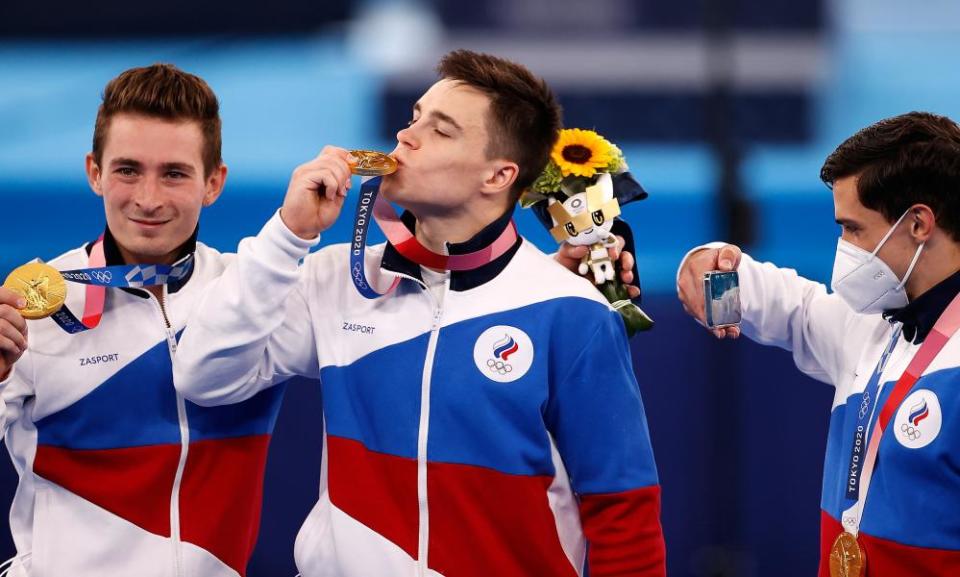ROC gymnasts edge out Japan in thrilling Olympic men’s team final

For what felt like beyond an eternity, all Nikita Nagornyy could do was stand on the light blue borders of the floor and wait for his turn. First he waited as the Chinese team, seemingly out of the race early on, finished solidly enough to give themselves a chance. Then he watched on as a great talent began to blossom, the 19-year-old new superstar of Japanese gymnastics, Daiki Hashimoto, finishing his spotless horizontal bar routine with a stuck landing.
Then, finally, he stepped up for his floor routine. Russian gymnasts had not won a team gold medal in 25 years. Nagornyy, arguably the best men’s gymnast and floor worker in the world, was expected to deliver in the final routine of the final. Under huge pressure, he did just that with six spotless landings. The Russian Olympic Committee became men’s team all-around Olympic champions by edging out the brilliantly young Japanese team by just 0.103 points. They finished with 262.500 points to Japan’s 262.397.
Related: Tom Daley ‘incredibly proud to say I am gay and an Olympic champion’
Although they played no real role in the brilliant medal shakeup, finishing over six points behind China with a score of 255.760, Great Britain departed the arena pleased by an excellent fourth place finish, holding off the United States and outdoing the predictions of many in the process.
The men’s team final is the closest thing to a gymnastics marathon event. It requires 18 routines of each team across three hours, where just a few errors can change the complexion of the contest.
The ROC team had started off extremely well, as Nagornyy elevated his form from qualifying and his teammates followed his lead. Artur Dalaloyan, three months after he tore his achilles tendon, demonstrated his character throughout, particularly with a sublime double handspring front vault on his injured foot.
China, meanwhile, had opened with an early error by Lin Chaopan in his floor routine so they were chasing from the beginning. The Japanese team, a sturdy group of teenagers and improvers in the place of the old guard that won in 2016, oscillated between second and third place throughout the night.
ROC had led second-placed China by over 3.4 points going into the fifth rotation, but on the high-scoring parallel bars both China and Japan reeled them back in. By the sixth and final rotation, the ROC’s buffer was just 0.6 points to China and 1.3 to Japan. Nerves surfaced as Denis Ablyazin underperformed on the floor, then Dalaloyan leapt out of bounds during an otherwise tremendous effort.
It came down to the final two routines. Hashimoto’s faultless horizontal bar routine yielded an enormous 15.100 points. Nagornyy followed immediately with his floor routine that included an improvised triple twist. Then he was forced to wait again, this time for his score, tears welling in his eyes.
When the ROC team finally learned that they were champions, Nagornyy, Dalaloyan and the veteran David Belyavskiy openly wept. It was the closest final since the dawn of the open code in 2006; ROC and Japan completed 36 routines between them on six pieces of apparatus over three hours and yet all that could separate them was 0.103 points. “Do you remember about the typhoon this morning?” Nagornyy said later. “Well, the typhoon has happened. We took the medal, so don’t worry about the typhoon anymore.”
As the ROC celebrated, Great Britain also left filled with satisfaction. Both Joe Fraser, steadily rising as one of the best all around gymnasts, and James Hall contributed scores on all six pieces and they were solid and consistent throughout. Max Whitlock stood up to the moment as he usually does. Giarnni Regini-Moran blazed through parallel bars and his exhausting eight-line floor routine. In the mixed zone afterwards they found the right balance between satisfaction and determination for more.
“We knew the top three teams were going to be hard to break into. The margin was five or six marks so fourth place was a really huge achievement for us. Now we can work on that, look at closing that gap and get into those medal positions,” said Whitlock, who underlined the youth of his teammates. Then he shrugged. “We’ve done it before.”

 Yahoo Finance
Yahoo Finance 